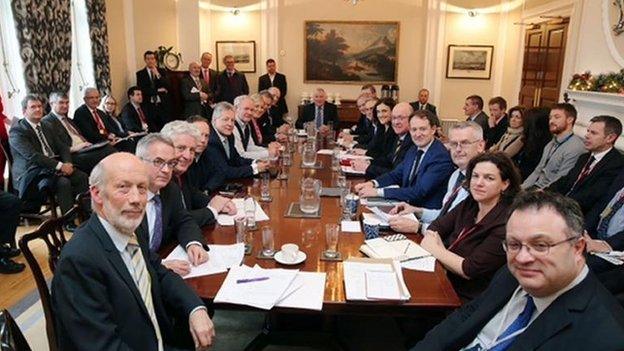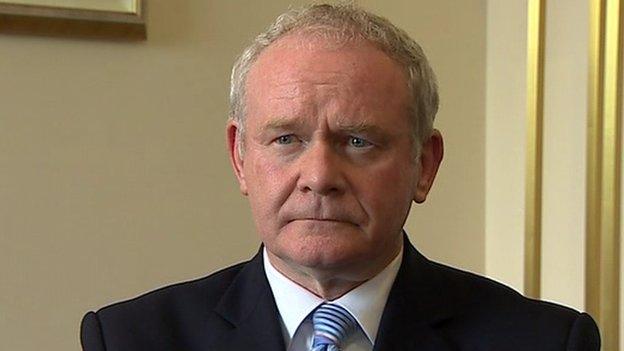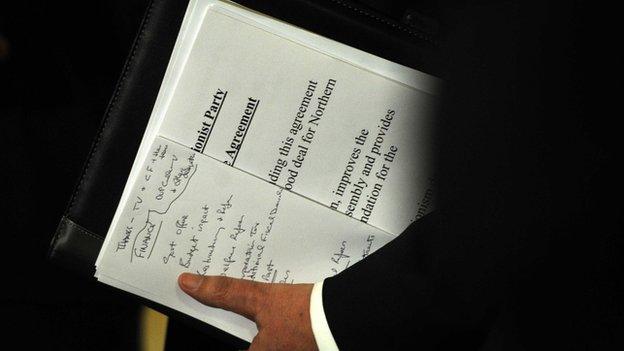Stormont crisis: What is at risk if the Stormont House Agreement breaks down?
- Published

The Stormont House Agreement was reached just before Christmas
Stormont is facing another crisis, according to Northern Ireland's Deputy First Minister Martin McGuinness, after a public row over welfare reform.
He warned the latest dispute could have "profound implications" for Northern Ireland's political institutions but what are those implications?
BBC News NI looks at what is at risk of stalling if the deal breaks down.
Corporation tax
Corporation tax is a tax on the profits made by companies. The current rate paid by businesses in Northern Ireland is 21%, compared to 12.5% in the Republic of Ireland.
The government intended to allow Stormont to set its own rate of the tax before May's general election. On Friday, Peter Robinson said he expected the bill to be passed by the Lords on St Patrick's Day.
But the Stormont House Agreement explicitly ties the devolution of corporation tax to getting a welfare bill through Stormont.
Civil Service redundancies
A week ago, the new Civil Service voluntary redundancy scheme opened - by the end of the week more than 3,200 had expressed interest.
The scheme was another of the measures agreed as part of the Stormont House talks. The aim is to lose the equivalent of 2,400 full-time civil service posts, saving around £90m from the civil service's annual pay bill.
This was to be paid for out of additional borrowing and spending powers agreed as part of the Stormont House Agreement.
However, Northern Ireland's Finance Minister Simon Hamilton said he will now have to clarify with the Treasury if no welfare reform bill will mean no loans for the voluntary exit schemes.
Welfare reform
Stormont has so far resisted the introduction of measures such as a welfare cap, the reform of Disability Living Allowance (DLA) and the spare room subsidy, also known as the bedroom tax.
The delay was due to opposition from Sinn Féin and the SDLP.
During the Stormont House Agreement talks, MLAs struck a deal to create a fund that would assist benefit recipients who will lose money as a result of the reforms.
The Westminster government and the DUP had warned that an unreformed system would leave Northern Ireland with its own welfare arrangements, which would have escalating costs and complexity.
Block grant reductions
Stormont's block grant - the money Northern Ireland gets from the Treasury - has already been reduced as a penalty for not implementing welfare reforms passed by Westminster.
The reductions , referred to as Treasury 'fines' by some commentators, have cost Stormont £100m to date.
A further £114m is due to be taken out of the block grant this year, but that figure was set to be proportionately reduced if MLAs implemented welfare reform in time.
But if the Stormont House Agreement falls apart, the full penalty is likely to be re-imposed.
NI department budgets 2015-16
Passing the budget was a key requirement of the Stormont House Agreement, but to balance their books, some Northern Ireland departments face cuts of about 10%.
Ministers have been faced with "tough choices" as they decide where the axe will fall.
Last week, Education Minister John O'Dowd warned 500 teachers and 1,000 support workers could lose their jobs as a result of cuts to his budget.
The PSNI's Chief Constable said he will have 200 fewer officers than he needs next year and Regional Development Minister Danny Kennedy said he does not have enough money to fund basic services like traffic light repairs.
On Friday, public sector workers, including health staff, teachers, bus and rail drivers, plan to strike in protest against the cuts and job losses already announced.
Stormont's financial situation is unlikely to improve as a result of the latest political crisis.
Historical Investigations Unit (HIU)
A new independent body, the Historical Investigations Unit (HIU), was to be set up to carry out fresh investigations into unsolved Troubles-related deaths.
A previous body, the Historical Enquiries Team (HET), had been undermined by an inspection report that found it investigated state killings with "less rigour" than those carried out by people who were not members of the security forces.
The HET wound up late last year and the PSNI's new Legacy Investigations Branch (LIB) has now taken on the cases, until legislation is passed to create the HIU.
Last month, Chief Constable George Hamilton said he expected this process could take 18-24 months, so it would be two years before the HIU could start work.
A failure to implement the Stormont House Agreement will mean further delay and uncertainty for the families seeking independent investigations into their loved ones' deaths.
- Published9 March 2015

- Published9 March 2015

- Published9 March 2015
